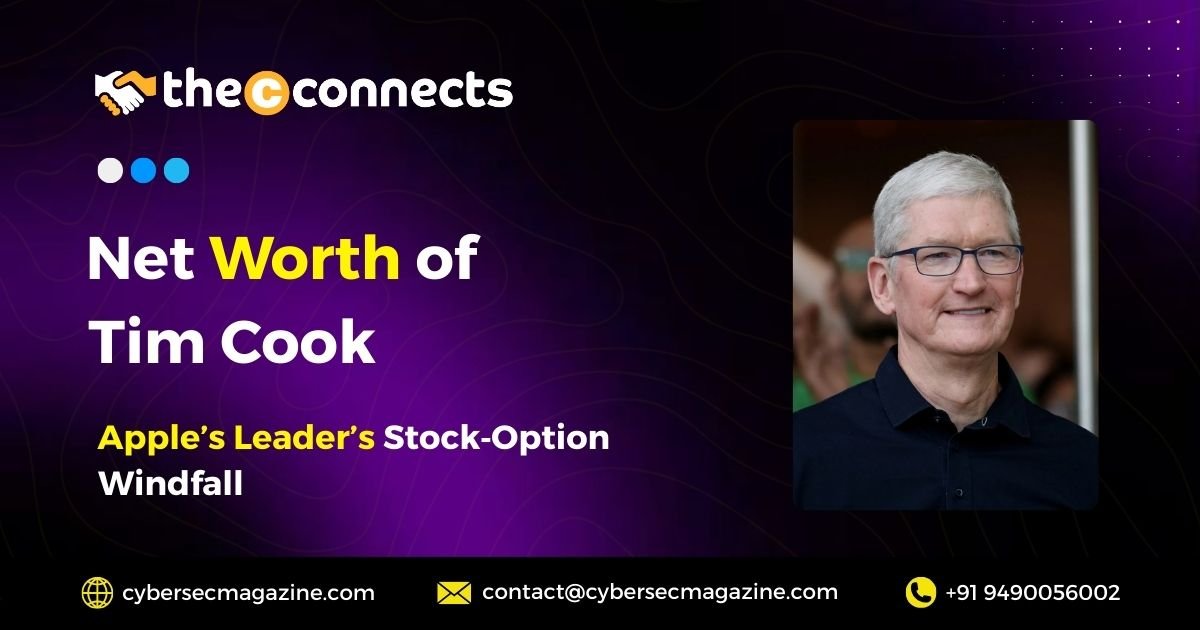For the discerning readership of TheCconnects magazine-comprising astute entrepreneurs, seasoned business leaders, and C-Suite professionals-the topic of executive compensation is not merely a matter of interest, but a critical lens into corporate strategy and shareholder alignment. Few executives embody the complexity and scale of modern corporate wealth better than Tim Cook, the CEO who ascended to the helm of Apple Inc., a company that has redefined the meaning of market capitalization. Cook’s personal fortune, a net worth estimated to be in the low billions, stands as a testament not to a founder’s majority stake, but to the extraordinary leverage provided by performance-based stock awards and the unprecedented growth of the tech giant he manages.

The Anatomy of a Non-Founder Billionaire’s Wealth
Tim Cook’s journey to billionaire status is a masterclass in executive reward, a narrative fundamentally different from that of tech titans like Jeff Bezos or Elon Musk, who built their wealth on massive, foundational ownership stakes. Cook, the operational genius who joined Apple in 1998, secured his fortune almost entirely through his compensation package-primarily Restricted Stock Units (RSUs) and other equity grants tied to the company’s performance.
As of early 2025, Cook’s net worth is consistently estimated in the range of $1.9 billion to $2.5 billion. While an astonishing sum, it is important to note his relatively modest ownership slice: he holds only about 3.3 million shares, representing a minuscule 0.021% of Apple. This contrast highlights the immense value accretion Apple has experienced under his tenure, transforming a relatively small percentage of shares into a colossal personal fortune.
The Cornerstones of Cook’s Compensation
Cook’s total annual compensation is a layered structure, deliberately designed to align his interests with long-term shareholder value:
- Base Salary: A relatively fixed component, often around $3 million annually, which, for a leader of his stature, is largely symbolic.
- Annual Cash Bonus: Tied to the achievement of pre-determined operational and financial targets, such as net sales and operating income. This component can add millions to his annual take-home.
- Stock Awards (Equity Grants): This is the engine of his wealth. These RSUs typically vest over time, often contingent on Apple’s Total Shareholder Return (TSR) relative to an index or peer group. This performance-based vesting mechanism ensures that Cook is rewarded for outperforming the market, a key metric for institutional investors.
The 2011 Mega-Grant and the Windfall Decades
The defining moment in Cook’s financial history was his 2011 promotion to CEO. Upon taking the reins from Steve Jobs, the Apple board granted him a monumental equity package-one million shares of restricted stock-which was set to vest in two installments after a decade of service. This was an extraordinarily long-term incentive designed to anchor him to the company.
The first major tranche of this original grant fully vested in August 2021, a decade after the grant date. By that point, Apple’s stock price had soared by well over 1,000% since his CEO appointment. The value of this single vesting event-which included both time-based and performance-based RSUs-approached three-quarters of a billion dollars (around $750 million at the time). This colossal, one-time payout was the quintessential “stock-option windfall” that officially cemented his status as a billionaire and provided a significant, discrete jump in his net worth.
The 2021 event was a vivid illustration of how exponential growth in a company’s market capitalization-which rose from $377 billion in 2011 to nearly $2.5 trillion by the time of the vest-translates into executive wealth, even with a small equity holding.
Shareholder Scrutiny and Compensation Evolution
The size of Cook’s compensation has inevitably drawn intense scrutiny from institutional shareholders, a vital consideration for a C-Suite audience. Following his staggering $99 million total compensation package in 2022, a proposal to cut his target compensation in 2023 was advanced by Apple’s compensation committee, largely in response to shareholder pushback where only 64% approved his pay.
For 2023, his target compensation was reduced to $49 million, a voluntary pay cut of over 40%, demonstrating the board’s responsiveness to investor sentiment. His final take-home for that year, however, still exceeded the target, landing at approximately $63.2 million, underscoring the intrinsic linkage between Apple’s continued operational excellence and his performance bonuses.
This dynamic tension-between rewarding a CEO who has steered a company to a multi-trillion-dollar valuation and the need to maintain perceived pay equity-is a key governance challenge for all major corporations. Apple’s compensation structure under Cook has evolved to be highly nuanced, using metrics that measure:
- Absolute Stock Return: The sheer rise in AAPL stock price.
- Relative Stock Return: How AAPL stock performs against the S&P 500 or an established peer group of 28 companies, including Microsoft, Alphabet, and Amazon.
This relative performance modifier is a sophisticated mechanism to ensure the reward is earned, not merely the product of a rising tide lifting all boats.
A Legacy of Philanthropy and Succession Planning
A crucial aspect of Cook’s personal wealth strategy, often cited in SEC filings and discussions, is his public commitment to philanthropy. Cook has explicitly stated his intention to donate the majority of his wealth before he dies, a stark philosophical contrast to the dynastic accumulation of wealth seen elsewhere. This dedication influences his approach to stock liquidity and is a subtle, yet effective, counterpoint to compensation criticism.
Furthermore, his equity vesting schedule is closely linked to his expected tenure. The major equity awards granted in recent years, including the substantial one from 2021, have vesting periods that extended through 2025. This timing has fueled speculation-and intensified succession planning discussions among the board-about his eventual retirement, an outcome that will not diminish his wealth but will finalize the last of his major performance-based windfalls.
Ultimately, Tim Cook’s net worth is a fascinating study in corporate finance: a high-leverage reward system that delivered one of the largest non-founder executive windfalls in history, meticulously tied to a decade of operational brilliance and unprecedented shareholder returns.
Interested in featuring your thought leadership in TheCconnects magazine? We are actively looking for insights from entrepreneurs, business leaders, and C-Suite professionals. Submit your details to get featured or publish your article on our website
Contact Us
For immediate support, contact us at:
- contact@thecconnects.com
- +91 91331 10730
- WhatsApp us at https://wa.me/919133110730



